In the Golden Palm-winning film Farewell My Concubine there are hints that the boy was straight when he was first enrolled in an opera school. It was literally beaten into him that he must take himself as a girl since he was assigned to play exclusively female roles. While empirical evidence shows the percentage of gays in this profession is higher than the general population, it would be wrong to make sweeping assumptions. By simply talking to some of the models who appear on the TV show in drag, it was pretty obvious to me some of them took it for nothing more than a job. If playing male roles would get them more money, they wouldn't think twice but switch gender roles.
More than the rationale for female impersonation is the analysis of the audience, an area where China diverges sharply from a Western country. While drag shows in San Francisco, for example, attract predominantly young males or gays, the most loyal audience in China for an artist like Li Yugang is made up of females and the elderly, the more conservative strata of society. I queried a few of them, and their answers were illuminating.
They totally accept men as men and women as women. That is the norm on stage or on screen. But when a man plays a woman so exquisitely, he is actually "more feminine than a woman". This is a refrain heard all around. It dawned on me that it's the transcendence that makes the magic. Think of all the Hollywood actors who drastically changed their looks and brought home the golden statuettes. Well, Chinese audiences tend to give extra points for credible turnouts that transform the actor's gender in appearance or singing voice.
That is why Mei Lanfang was a national treasure and cross-dressing opera performance a high art. The actor has to be "more feminine than a woman" but he must not cross over into farce. There is often a restraint in the sumptuousness of the costume and makeup.
Still, authorities are not yet comfortable with all cross-dressing shows, inadvertently making such shows in Thailand wildly popular with Chinese tourists, who harbor a mixture of curiosity, mild put-down and secret admiration. It remains to be seen whether Li Yugang, now enshrined in State sponsorship, will be an isolated case or a pioneer like Mei. (Unlike Mei, he dons both male and female garb.)
Outside the pantheon of high art or the shelter of low comedy are few discussions about the meaning of such gender-twisting attempts. Of course there are people who are concerned with the loss of masculinity, not just of a few performers, but of a whole nation. But looked at another way, the scale is tipped slightly toward women as men dressed as women are inherently perceived a peg down from their traditional male dominance and therefore are more embraced by women. It's almost a visualization of exploring one's "feminine side".
As long as people are not forced into such practices, how one dresses or how one identifies with gender roles is ultimately a private matter. Like all experiments or obsessions, it could be a fad or it could have psychological roots. But only a few can elevate it into art. And only then will the public find beauty in it.

 Annual airshow kicks off in Houston
Annual airshow kicks off in Houston Five fighters in flight training
Five fighters in flight training Volkswagen showcases new energy vehicles in Beijing
Volkswagen showcases new energy vehicles in Beijing 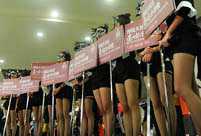 Different eye catching shows at housing fairs in China
Different eye catching shows at housing fairs in China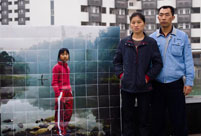 Special family portraits call attention to left-behind children
Special family portraits call attention to left-behind children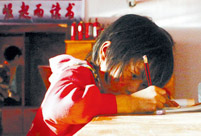 Migrant children’s pain and joy in city
Migrant children’s pain and joy in city Lingerie show dazzles Wuhan Motor Show 2013
Lingerie show dazzles Wuhan Motor Show 2013 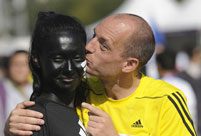 Running in fun customs at Beijing Int'l Marathon
Running in fun customs at Beijing Int'l Marathon 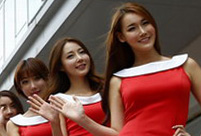 Weekly Sports Photos
Weekly Sports Photos Chinese riot police take Liberia peacekeeping mission
Chinese riot police take Liberia peacekeeping mission World has never been dark-- a blind kid’s life in Tibet
World has never been dark-- a blind kid’s life in Tibet Oriental education or western education?
Oriental education or western education? China in autumn: Kingdom of red and golden
China in autumn: Kingdom of red and golden Pet costume competition
Pet costume competition Chinese screen goddesses from Beijing Film Academy
Chinese screen goddesses from Beijing Film Academy Day|Week|Month